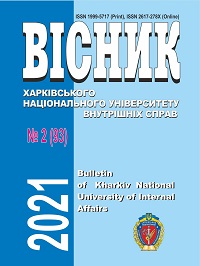On Improving Administrative and Legal Provision of HR Management in State Forensic Institutions and Professional Training of Forensic Experts of the Ministry of Justice of Ukraine
DOI:
https://doi.org/10.32631/v.2021.2.14Keywords:
state forensic institutions, workforce policies, recruitment division, HR management, mentoring, employee pool for superior positions, professional training.Abstract
The problematic issues of administrative and legal provision HR management of state forensic institutions and professional training of forensic experts of the Ministry of Justice of Ukraine have been studied. Specific propositions for improving the regulatory and legal, organizational and methodological provision of this area of activity have been provided. The author has emphasized the need to reform the HR management system of state forensic institutions and professional training of forensic experts, which is a guarantee of filling these institutions with highly qualified personnel.
It has been offered to further study, develop and approve certain regulatory acts by orders of the Ministry of Justice of Ukraine on HR management of state forensic institutions and professional training of forensic experts, namely: standard staffs; instructions on the organization of personnel accounting, staffing and HR work, professional training of forensic experts of state forensic institutions and forensic experts who are not employees of state forensic institutions; provisions on the formation of employee pool for superior positions.
The emphasis has been placed on the need to revise and update the Handbook of Qualifications for employees of forensic research institutions of the Ministry of Justice of Ukraine, approved by the order of the Ministry of Justice of Ukraine dated from April 19, 2012 No. 611/5.
It has been proved that the Code of Professional Ethics of forensic experts has to be developed and approved at the level of the Cabinet of Ministers of Ukraine, which would be applied to all forensic experts of Ukraine regardless of departmental subordination and employment and should have a positive impact on the quality of judicial duties performed by forensic experts – drawing up qualitative and objective expert opinions. The guarantee of executing the requirements of the specified Code by the experts should be the normative consolidation of the expert’s responsibility for violation of professional ethics.
Downloads
References
Hasparian S.H., 2019. Administrative and legal principles of staffing of forensic institutions of Ukraine [Administratyvno-pravovi zasady kadrovoho zabezpechennia sudovo-ekspertnykh ustanov Ukrainy]. Abstract of Ph.D. dissertation. Hon. Prof. M. S. Bokarius Kharkiv Research Institute of Forensic Examinations.
Hasparian S.H., 2018. Ways to improve the quality of training for forensic institutions of the Ministry of Justice of Ukraine [Shliakhy pidvyshchennia yakosti pidhotovky kadriv dlia sudovo-ekspertnykh ustanov Ministerstva yustytsii Ukrainy]. Teorìâ ta praktika sudovoï ekspertizi ì krimìnalìstiki – Theory and Practice of Forensic Science and Criminalistics, Iss. 18, рр. 281-287.
Kliuiev O.M., 2019. Problems of professional development of employees of forensic institutions of the Ministry of Justice of Ukraine [Problemy rozvytku profesiinoho rivnia pratsivnykiv sudovo-ekspertnykh ustanov Ministerstva yustytsii Ukrainy]. In: Hon. Prof. M. S. Bokarius Kharkiv Research Institute of Forensic Examinations et al. Topical issues of forensic science and criminology [Aktualni pytannia sudovoi ekspertyzy i kryminalistyky]. Kharkiv, 18-19 April. Kharkiv: Kharkivskyi naukovo-doslidnyi instytut sudovykh ekspertyz im. Zasl. prof. M. S. Bokariusa. Pp. 29-31.
Petrova I.A., 2017. Scientific component in the formation of a forensic expert [Naukova skladova u formuvanni sudovoho eksperta]. In: Hon. Prof. M. S. Bokarius Kharkiv Research Institute of Forensic Examinations et al. Topical issues of forensic science and criminology [Aktualni pytannia sudovoi ekspertyzy ta kryminalistyky]. Kharkiv, 7-8 November. Kharkiv: Kharkivskyi naukovo-doslidnyi instytut sudovykh ekspertyz im. Zasl. prof. M. S. Bokariusa. Pp. 78-79.
Petrova I.A., 2019. On the question of the objective necessity and importance of business evaluation of employees of forensic institutions [Do pytannia obiektyvnoi neobkhidnosti ta znachennia dilovoi otsinky pratsivnykiv sudovo-ekspertnykh ustanov]. Teorìâ ta praktika sudovoï ekspertizi ì krimìnalìstiki – Theory and Practice of Forensic Science and Criminalistics, Iss. 19, рр. 130-141.
Klochko A.M., 2014. Staffing of internal affairs bodies of Ukraine: procedure and main elements [Kadrove zabezpechennia orhaniv vnutrishnikh sprav Ukrainy: poriadok ta osnovni elementy]. Forum prava – Forum of Law, [online] No. 4, рр. 175-180. Available at http://nbuv.gov.ua/j-pdf/FP_index.htm_2014_4_32.pdf [Accessed 25 April 2021].
Kozak K.B. and Ruban Yu.O., 2013. Improving the work of the personnel service at the enterprise [Udoskonalennia roboty sluzhby personalu na pidpryiemstvi]. Ekonomìka harčovoï promislovostì – Food Industry Economics, No. 2, рр. 24-28.
Komirchyi P.O., 2019. Forms of staffing the public service in the law enforcement sphere of Ukraine [Formy kadrovoho zabezpechennia publichnoi sluzhby v pravookhoronnii sferi Ukrainy]. Pìvdennoukraïnsʹkij pravničij časopis – South Ukrainian Law Journal, No. 3, рр. 139-142.
Repeshko P.I., 2011. Mechanisms for staffing forensic activities in Ukraine [Mekhanizmy kadrovoho zabezpechennia sudovo-ekspertnoi diialnosti v Ukraini]. Ekonomika ta derzhava, No. 8, рр. 138-140.
Chemekov V.P., 2007. Grading: technology for building a personnel management system [Greiding: tekhnologiya postroeniya sistemy upravleniya personalom]. Moscow: Vershina.



